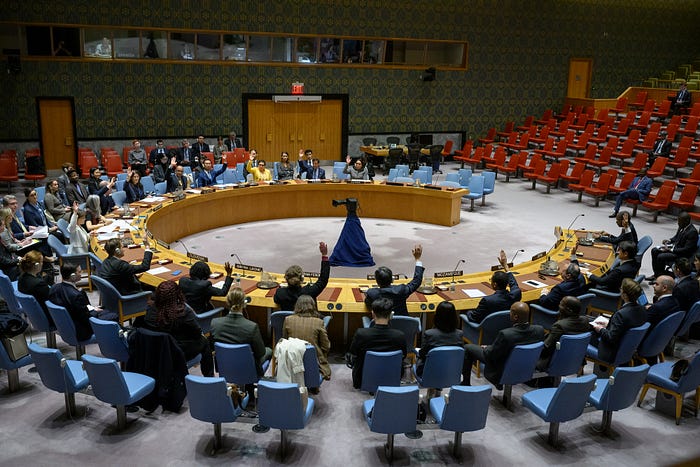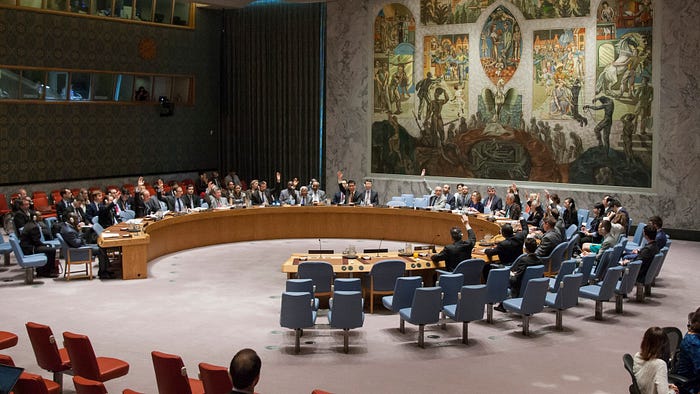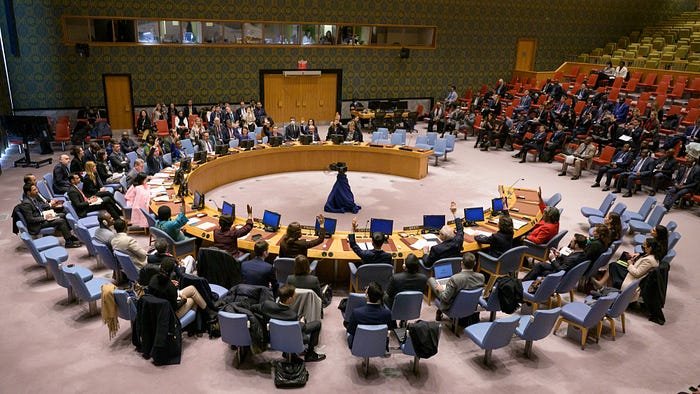This Tuesday, the UN honoured fallen colleagues and reminded the world that aid workers should never be a target, as 2024 saw a shocking new record of 383 aid workers killed.
This Tuesday, the UN honoured fallen colleagues and reminded the world that aid workers should never be a target, as 2024 saw a shocking new record of 383 aid workers killed.

From Haiti and Yemen to Somalia and the Democratic People’s Republic of Korea, the Security Council has used its authority to enact targeted sanctions, including travel bans, asset freezes and arms embargoes, against individuals or entities it deems a threat to international peace and security. These measures are more precise than the comprehensive sanctions imposed on entire nations during the latter part of the 20th century. Sanctions continue to change, largely in response to humanitarian concerns and questions of due process.
Today, there are 14 ongoing sanctions regimes in place. They support political settlement of conflicts in the Central African Republic, Libya, Sudan, South Sudan and Yemen. They aim to prevent escalating violence, insecurity, and criminal activities perpetrated by armed gangs in Haiti. They also seek to deter unconstitutional changes of government in Guinea Bissau. Additionally, they constrain the proliferation activities of the DPRK and the terrorist threats posted by ISIL (D’aesh) & Al-Qaida and Al-Shabaab. The Security Council Affairs Division (SCAD) in the Department of Political and Peacebuilding Affairs (DPPA) is responsible for assisting the Council in the design, implementation and evaluation of these sanctions regimes. Each regime is administered by a sanctions committee chaired by an elected member of the Council. There are currently nine monitoring groups, teams and panels that support the work of 10 of the 14 sanctions committees.
Security Council sanctions can be broadly considered as measures strategically imposed to restrict activities in a wide range of areas, aimed at achieving peace and security objectives. They are not meant to be punitive an end in themselves, but to be part of a comprehensive strategy, working in tandem with political dialogue, mediation, peacekeeping and special political missions to counter terrorism, prevent the spread of nuclear weapons and facilitate political settlements in countries emerging from conflict. The most common sanctions measures are arms embargoes, asset freezes and travel bans while others include commodity bans, maritime interdiction and restrictions on technical assistance.
Sanctions are designed to achieve their intended objectives through three primary mechanisms: coercion — imposing economic or political costs on a target to compel a change in behaviour; constraint — limiting an individual or group’s ability to act by restricting access to particular resources; and signaling — sending a clear message that certain behaviour are inappropriate and may lead to further measures.
One oft-cited successful sanctions regime is the Liberia sanctions regime, established by resolution 1521 (2003), in which the Council established a Committee to oversee an arms embargo, travel ban and trade sanctions on Liberia. The sanctions, which included a ban on diamond imports from that country, was lifted by the Council in 2007, in response to the Government’s cooperation with a mechanism set up to keep “conflict diamonds” from reaching world markets. The travel ban and asset freeze measures were lifted in 2015, and the sanctions regime was terminated in 2016.

However, while UN sanctions remain key instruments for maintaining international peace and security, views differ among Member States about their effectiveness. Some view arms embargoes and financial sanctions as essential for curbing violence and enforcing peace deals, while others argue that prolonged sanctions become ineffective and have unintended humanitarian consequences on civilians.
In response to humanitarian concerns over sanctions, the Council adopted resolution 2664 (2022), which introduced a humanitarian “carve out” to asset freezes across all UN sanctions regimes. Through this “carve out”, the Council ensured that “the provision, processing or payment of funds, other financial assets or economic resources or the provision of goods and services necessary to ensure the timely delivery of humanitarian assistance or to support other activities that support basic human needs” are not violations of UN sanctions. The text noted that this provision applied to all sanctions regimes equally, with the exception of 1267/1989/2253 ISIL (Da’esh) and Al-Qaida sanctions regime, which was initially covered for two years only. It has since been extended indefinitely through resolution 2761 (2024).

Prior to the adoption of resolution 2664, humanitarian organizations had to go through lengthy and often unclear administration processes to ensure compliance with sanctions regimes and to prove that aid gets to those in need without being diverted to sanctioned entities or individuals. The resolution has streamlined the process in most cases.
There have been other important developments in the UN sanctions landscape over the last few years. In October 2022, a new sanctions regime was established on Haiti. The sanctions regime on Mali was discontinued in August 2023 after the Council failed to reach an agreement on its renewal. On 28 March 2024, the Council failed to adopt a resolution that would have extended the mandate of the Panel of Experts assisting the DPRK Sanctions Committee due to a veto cast by the Russian Federation. On 19 July 2024, the Council passed resolution 2744 (2024), which strengthened the mandate of the Focal Point for De-listing by establishing new and improved delisting procedures for all individuals and entities on UN sanctions lists, other than the ISIL (Da’esh) and Al-Qaida Sanctions List which fall under the purview of the Office of the Ombudsperson for the ISIL (Da’esh) & Al-Qaida Sanctions Committee and the ISIL (Da’esh) & Al-Qaida Sanctions Committee itself. The text also established an Informal Working Group on general Security Council sanctions issues. On 30 July 2024, the Council, through resolution 2745 (2024), lifted the arms embargo on the Central African Republic while maintaining restrictions on the supply of arms and military assistance to armed groups. On 29 July of this year, the Council renewed those restrictions.
Russian drone strikes on Ukraine overnight including in the cities of Kharkiv and Zaporizhzhia reportedly killed at least 14 people – including three children.
UN aid teams in Gaza say that they’re only able to get less than half the lifesaving food support that is needed into the war-torn enclave.
Assistant Secretary-General for Africa, Martha Pobee, briefed the Security Council on the deteriorating security and humanitarian conditions in South Sudan on Monday.
Adam Ibrahim was working with the UN humanitarian agency, OCHA, in his home country, Sudan, when conflict between rival armed forces erupted in early 2023 and he became a refugee alongside thousands of others who continue to flee the ongoing violence.
Without an urgent and unrestricted flow of aid, Gaza’s already dire humanitarian crisis could deteriorate further, the UN warned on Friday.
The United Nations has reiterated the importance of dialogue as US President Donald Trump and Russian President Vladimir Putin prepare to meet on Friday in Alaska, with Ukraine top of the agenda.
When Israeli forces in Gaza issue a new displacement order ahead of an incursion into a neighbourhood or city, Palestinian civilians are expected to pack their bags and flee – perhaps for the third, fourth, or tenth time.
From 11–15 August, UNOAU in collaboration with the UN C4ISR Academy for Peace Operations (UNCAP), the AU, and the North Atlantic Treaty Organization (NATO), held a joint team development and coaching workshop in Entebbe, Uganda.
The workshop aimed to strengthen strategic cooperation among the AU, UN and NATO by fostering mutual understanding, enhancing collaboration and building leadership capacity. It also focused on...
Top UN human rights investigators said on Thursday that war crimes may have been committed in predominantly Alawite areas of Syria in a wave of deadly violence earlier this year.
UN peacekeepers in southern Lebanon have uncovered rocket launchers, mortar rounds and other unauthorized weapons, while the country grapples with a severe drought, threatening millions with life-threatening water shortages.
Sexual violence in conflict zones rose sharply in 2024, increasing by a quarter compared to the previous year, the UN reported on Thursday. More than 4,600 survivors endured abuses used as weapons of war, torture, terrorism and political repression.
Across the globe, consumers and small-scale fishers alike are facing a growing challenge: seafood fraud.
UN human rights chief Volker Türk has expressed outrage over Monday’s deadly large-scale attack by the Rapid Support Forces militia on El Fasher, the capital of Sudan’s North Darfur state, which has been besieged by the RSF since April last year.
The UN Security Council has rejected the Rapid Support Forces’ (RSF) declaration last month of a rival administration in parts of Sudan it controls, warning the move threatens the country’s unity and risks worsening the brutal conflict between the militia and forces of the military government.
The UN has expressed deep alarm over a large-scale assault by the Rapid Support Forces (RSF) militia on El Fasher, the government-held capital of Sudan’s North Darfur State, and the nearby Abu Shouk displacement camp, which has been under siege since April 2024.
During her final briefing as resident and humanitarian coordinator for Haiti, Ulrika Richardson struggled to describe the realities of life in Haiti.
UN-mandated independent investigators have uncovered “systematic torture” in Myanmar’s military-run detention facilities – including beatings, electric shocks, strangulations and gang rape – a pattern of atrocities which is intensifying across the country.
Public health conditions in Gaza are “catastrophic”, with hospitals operating far beyond capacity. Some life-saving medicines are totally out of stock, while deaths from malnutrition and disease are on the rise, the UN health agency warned on Tuesday.
The transformation over two decades of the once thriving Syrian city of Sweida from tourist destination to a landscape marked by violence and loss has been detailed by the chief of a UN migration mission who recently visited the area.
The UN organization which champions culture and education, UNESCO, has strongly condemned the targeted killing of six journalists in Palestine by an Israeli drone on 10 August.
UN Special Envoy for Yemen Hans Grundberg, briefing the Security Council on Tuesday, voiced concern over the latest clashes between Government forces and Houthi rebel militia.
Across war-torn Sudan, civilians continue to face ongoing attacks, starvation and cholera outbreaks.
UN Secretary-General António Guterres has condemned the killing of six Palestinian journalists in Gaza this past weekend, his Spokesman said on Monday.
Shipping is crucial to the global economy, with more than 100,000 vessels a day transporting some 80 per cent of world commerce, but it remains vulnerable to disruptions caused by geopolitical tensions and transnational crime.
The humanitarian situation in Gaza continues to deteriorate, UN officials warned on Monday, describing overflowing hospitals, critically malnourished children, and desperate civilians risking their lives to secure food for their families.
This year’s International Youth Day theme, “Local Youth Actions for the SDGs and Beyond,”...
Mr. President, Excellencies,
I brief you for the second time this week as the situation in Gaza continues to deteriorate, placing over two million Palestinians in even greater peril and further endangering the lives of the remaining hostages.
The latest decision by the Government of Israel risks igniting another horrific chapter in this conflict, with potential consequences beyond Israel and the Occupied Palestinian Territory.
On 8 August, Israel’s Security Cabinet reportedly approved Prime Minister Netanyahu’s proposed plan for “defeating Hamas” and endorsed five “principles for ending the war”: the disarmament of Hamas, the release of all hostages; the Gaza Strip’s demilitarization; Israeli security control over the Strip; and the establishment of an alternative civilian administration that is neither Hamas nor the Palestinian Authority.
The Prime Minister’s office also announced that the Israel Defence Forces (IDF) will prepare to take control of Gaza City, while providing humanitarian assistance outside combat zones. The IDF said that it is fully mobilized and preparing for an expanded military operation in Gaza.
This is yet another dangerous escalation of the conflict.
For now, we have limited official details of Israel’s military plans. However, according to Israeli media reports, the government foresees the displacement of all civilians from Gaza City, by 7 October 2025, affecting some 800,000 people, many of them previously displaced. Reports indicate that the IDF would then surround the city for three months. This would then reportedly be followed by an additional two months to seize control of central Gaza’s camps and clear the entire area of Palestinian armed groups.
Mr. President,
We are already witnessing a humanitarian catastrophe of unimaginable scale in Gaza. Director Ramesh Rajasingham from OCHA will shortly provide you with the latest updates in this regard.
If these plans are implemented, they will likely trigger another calamity in Gaza, reverberating across the region and causing further forced displacement, killings, and destruction – compounding the unbearable suffering of the population. Last night thousands of protesters gathered in Tel Aviv and cities across Israel to call for a ceasefire and hostage release deal.
The UN has been unequivocal: the only way to stop the immense human suffering in Gaza is through a full, immediate, and permanent ceasefire. All hostages must be released immediately and unconditionally. Israel must comply with its obligations under international humanitarian law, allowing rapid, safe, unimpeded, and large-scale delivery of humanitarian aid to the population. Civilians – including humanitarian workers, and those seeking aid – must be protected.
Everyone has the right to life, liberty, and security. Palestinians must be able to return to their homes. In its 19 July 2024 Advisory Opinion, the International Court of Justice stated that “Israel, as the occupying Power, has the obligation not to impede the Palestinian people from exercising its right to self-determination, including its right to an independent and sovereign State, over the entirety of the Occupied Palestinian Territory”.
Mr. President,
As I emphasized to this Council a few days ago, there is no military solution to the armed conflict in Gaza or the broader Israeli-Palestinian conflict. There will be no sustainable solution without an end to Israel’s unlawful occupation and the achievement of a viable two-State solution. Gaza is, and must remain, an integral part of a Palestinian State.
We must plan for Gaza’s future as we address the urgency of developments on the ground today.
We must establish political and security frameworks that can relieve the humanitarian catastrophe in Gaza, start early recovery and reconstruction, address the legitimate security concerns of Israelis and Palestinians, and forge a path for the realization of a viable two-State solution. In this regard I urge the immediate implementation of the political, humanitarian, and security steps outlined in the New York Declaration on the Peaceful Settlement of the Question of Palestine and the Implementation of the Two-State Solution.
Critically, these frameworks must facilitate a legitimate Palestinian Government that can reunify Gaza and the West Bank, including East Jerusalem, politically, economically, and administratively. This Government must represent Palestinians across the entirety of the Occupied Palestinian territory. A united leadership is crucial to managing post-conflict Gaza and advancing Palestinian self-determination and sovereignty.
I urge the Palestinian Authority to advance its stated goal of holding elections. Palestinians have the right to have their voices heard and to be meaningfully included in the process of shaping the future of the State of Palestine.
Our ultimate goal remains unchanged: Israel and a fully independent, democratic, contiguous, viable, and sovereign Palestinian State, of which Gaza is an integral part – living side by side in peace and security within secure and recognized borders, on the basis of the pre-1967 lines, with Jerusalem as the capital of both States.
Thank you.
The UN Security Council has expressed alarm at the sharp escalation of violence in Syria’s Sweida region since mid-July, condemning attacks against civilians and calling for urgent protection and humanitarian access.
It’s essential to work towards a two-State solution to the Israel-Palestine conflict as the international community addresses the reality of starvation on the ground in Gaza, the Security Council heard on Sunday.
The UN Security Council met Sunday morning in New York following the Israeli cabinet’s decision to again expand its military operation inside the Gaza Strip and take full control of the key population centre of Gaza City. UN chief António Guterres described it earlier as a “dangerous escalation” for the two million civilians trapped in the enclave as well as the remaining Israeli hostages still held captive. Follow our Meetings Coverage Section’s live reporting of the crisis meeting and UN News app users can follow here.
The UN agency for Palestine refugees (UNRWA) has warned that the Gaza Strip faces a “catastrophic” humanitarian crisis, with no agency aid allowed in for more than five months and malnutrition deaths climbing sharply.
|
|
|
|
|
|
|
|
|
|
|
|
|
|
|
|